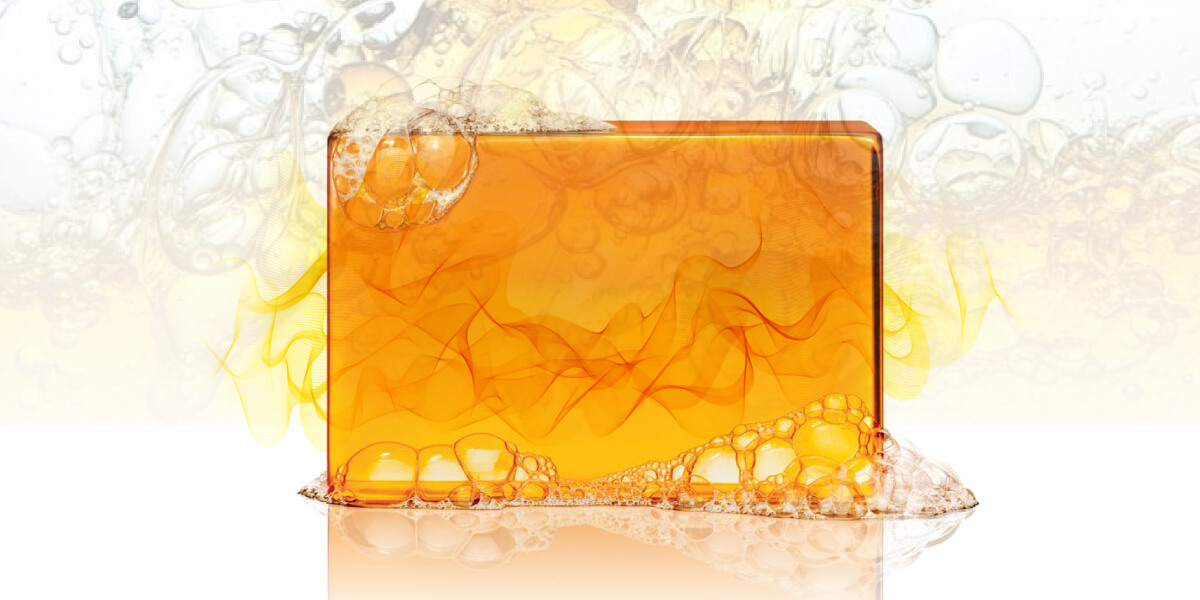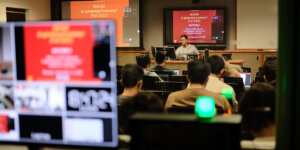
Catapower, a new business in the USC Viterbi Startup Garage, has developed a molecule to turn a plentiful biofuel byproduct into coveted sodium lactate, or glycerol, into gold (Illustration/Shadi Aminy)
Once just the stuff of hippie dreams, environmentally friendly biofuels have in recent years become increasingly popular.
Made from vegetable oil or animal fat, ethanol and a base catalyst, they can be added to diesel fuel to help power diesel engines. Unlike fossil fuels, biofuels produce emissions that complete a CO2 cycle over only a few years. They literally help transform waste into renewable energy through the use of solar energy and photosynthesis.
The production of biofuels, however, creates challenges of its own, including about 4.2-million metric tons of them per year for glycerol. A byproduct of the biomass refining process, glycerol is a colorless, odorless viscous liquid of little value. Biofuel manufacturers dispose of this simple polyol compound by paying somebody to pick it up, or, if lucky, sell it to feed producers for a few cents per pound. In Southeast Asia, many producers simply dump it directly into rivers.
Catapower, a new resident of the USC Viterbi School of Engineering’s Startup Garage, has come up with a way to “turn glycerol into something good,” according to cofounder Zhiyao Lu, Ph.D. chemistry ’16.
Lu, now a chemistry postdoc, and Travis Williams, a USC professor of chemistry and Lu’s graduate adviser, have designed and patented an iridium-based molecular catalyst that transforms glycerol into lactate sodium.
Natural, nontoxic and environmentally friendly, sodium lactate has several important uses, ranging from preserving and partially disinfecting animal carcasses after slaughter to preventing cracking in soap, Lu said. The $1.5 billion U.S. market for sodium lactate is growing by 7 percent per year.
“People have long been looking into a technology to convert glycerol into something valuable, and we have done it,” he said.
Earlier this year, as a measure of its potential, Catapower won the USC Wrigley Sustainability Prize.

Catapower cofounders Travis Williams, a USC professor of chemistry, and Zhiyao Lu, Ph.D. chemistry ’16, a chemistry postdoc (Photo/ courtesy of Zhiyao Lu)
Lu and Williams spent five years working on the catalytic technology before creating their “small molecular machine that keeps working and working and working until all the glycerol is converted into lactate,” Lu said. “All you have to do is put the glycerol in a huge pot, heat it up, add the molecule, and voila, the magic happens.”
Given their scientific backgrounds, though, Lu and Williams knew little about business. Thanks to the intervention of Andrea Belz, USC Viterbi vice dean for technology, innovation and entrepreneurship, who is also director of Innovation Node – Los Angeles – one of the national centers of the National Science Foundation’s Innovation Corps (I-Corps Program) – researchers soon made substantial progress on their entrepreneurial journey.
At Belz’s recommendation, the pair applied for and secured a place in the L.A. I-Corps Node. There, Lu and Williams attended several workshops, learning how to identify potential customers, their needs and how best to approach them – the basics of business building.
Impressed with Lu and Williams’ progress, Belz encouraged them to apply for a spot in the I-Corps Node national cohort in Austin, Texas. Upon their acceptance, Lu and Williams received $25,000, which they used to further refine their business model.
After talking to restaurant owners, oil company executives and biofuel producers executives in Texas, Lu and Williams decided that Catapower would sell or license its technology to biofuel firms interested in transforming glycerol into lactate. The researchers have yet to decide whether they might also act as a broker, for a fee, and sell the lactate to interested businesses.
More recently, Catapower was accepted to the Viterbi Startup Garage, USC Viterbi’s early-stage technology incubator. Lu said having a place to tinker, talk to mentors and learn from the other aspiring entrepreneurs at the Garage has made his burgeoning business that much better.
For now, Catapower survives on proceeds from the Wrigley Prize and the national I-Corps Node funding, along with a $300,000 NSF grant secured by Williams. The pair have had serious discussions with a couple major biofuel companies that have expressed interest in their technology. Lu said he expects Catapower – a name coined by his wife that signifies “catalytic, transformative and powerful” – to make its first sale by year end.
He credits much of his and Williams’ success to USC Viterbi’s backing.
“I think Viterbi is a leading example in Southern California in creating the entrepreneurial community environment, support, mentorship and everything in between to help give startups resources to be viable,” Lu said.
Published on January 25th, 2019
Last updated on May 14th, 2023











